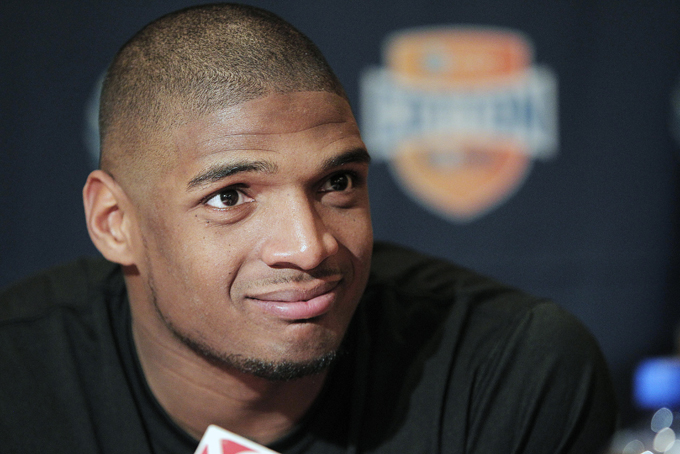
Michael Sam could redefine how we see Black manhood.
On Sunday night, Michael Sam made history. The college football standout and likely top NFL draft pick publicly acknowledged that he is gay, which would make him the first athlete in a major American professional team sport to announce he is gay at the very beginning of his career. Sam’s announcement is already one of the biggest sports stories ever, but the timing of his announcement could make it one of the biggest cultural stories ever as well.
Some of you may be scratching your heads right now trying to figure out why this story matters in an age in which the president of the United States is on the record supporting same-sex marriage, and NBA player Jason Collins came out as gay last year. But Sam’s story will likely have a far more significant impact than either of these milestones. Here’s why:
President Obama certainly has a measure of influence, particularly among Black audiences. When he first ran for president, data showed an “Obama effect” among Black test-takers whose scores markedly improved when he won. But influencing test scores in a condensed time frame is very different from having a long-term impact on community behavior. For instance, so far there is no data to suggest that the image of the president’s nuclear family, comprised of two married parents raising their children and two dogs together, has significantly altered the landscape within the Black community, in which single parenthood has become the norm. That is simply to say that altering social behavior in a meaningful way is a tall order for any one man, but it may be particularly tough for a president.
People look to presidents for guidance on a host of issues. Whether or not our nation should go to war, for instance, or whether a drastic overhaul of our nation’s health care system makes sense. Rarely do we look to our presidents to guide our behavior. All of the civil rights legislation President Lyndon Johnson helped pass certainly mattered in the lives of African Americans. But the White Americans in the real world, who attended school with Black Americans and realized their worlds did not fall apart following integration, ultimately mattered more.
You know who else mattered just as much as the laws themselves? Jackie Robinson, Nat King Cole and Sammy Davis Jr.—the mainstream Black celebrities who helped alter perceptions about Black people in a way the president at that time could not. Their cultural influence had an impact no politician could touch.
This is why Michael Sam’s coming out matters more in some ways than President Obama’s comments on LGBT rights, as significant as they have been. While people look to the president for leadership, few look to him to define masculinity. Instead many look to athletes for that, particularly in the Black community.
Many of the roots of homophobia in the Black community remain embedded in this antiquated notion of what it means to be a man, but specifically a Black man. Instead of this idea being tied to qualities like respecting women or taking care of any kids they father, manhood is somehow still largely portrayed, at least in imagery, as how physically strong men are and which women they can get with. (Even President Obama’s own image as a Black man is defined in large part by the fact that he snagged Michelle.)
But Sam has now permanently rocked that definition—in a way that no Black man and no Black athlete before him has. After all, Collins may have come out. But—no disrespect to him—the reality is that he did it at what was widely perceived as the end of his career, rather than the beginning, when there was no risk of leaving any real money on the table in terms of endorsement deals.
Sam, on the other hand, is confronting American homophobia squarely between the eyes. He is forcing the fans of one of the most macho sports to ask themselves the questions they’ve been able to avoid for decades: Would they rather not root for one of the most talented players, who may soon take the NFL field and who can help their team win, simply because he is more likely to find another player more attractive than one of the cheerleaders? Or would teammates rather play with a less talented player and lose for the same reason? But perhaps the biggest question of all: If Sam can play with the best of them, and beat the best of them, how can anyone, anywhere, define him as less than a man? And if he is just as much of a man as the men he beats on the field, then what exactly is the point of homophobia?
These are questions Obama and Collins couldn’t force sports fans to ask. But thanks to Michael Sam, there are African-American men and boys having that conversation in America today. And maybe, because of those conversations, homophobia will be close to a distant memory sooner, rather than later.
(Keli Goff is The Root’s special correspondent. Follow her on Twitter.)
Reprinted from the Tri State Defender
https://tsdmemphis.com/index.php/sports/19118-how-a-gay-football-star-could-change-black-america